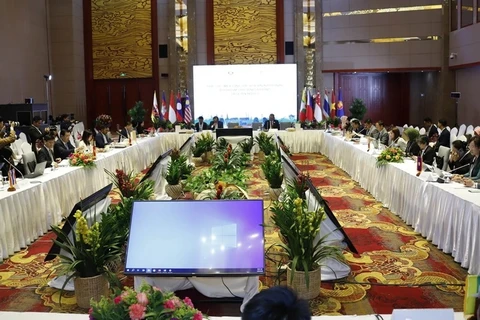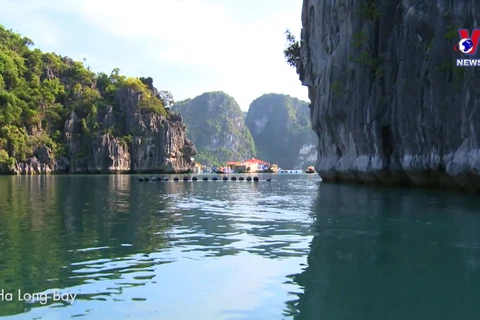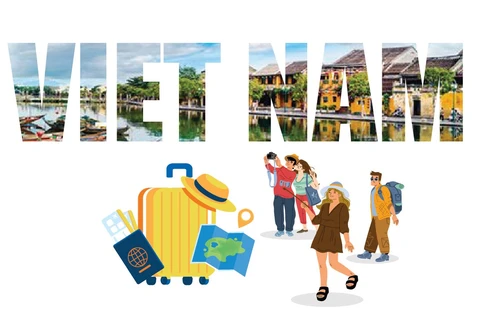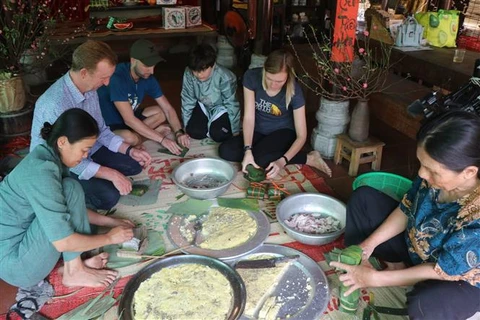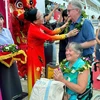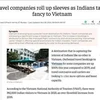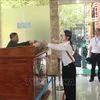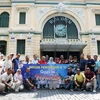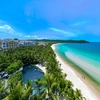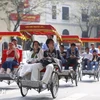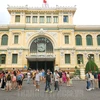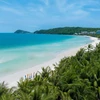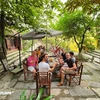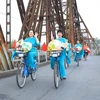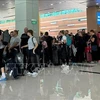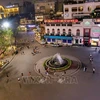 Foreign tourists are delighted at not only experiencing Vietnam as a destination but also receiving souvenir gifts (Photo: VietnamPlus)
Foreign tourists are delighted at not only experiencing Vietnam as a destination but also receiving souvenir gifts (Photo: VietnamPlus) Hanoi (VNA) - Directive 08/CT-TTg by the Prime Minister of the comprehensive, rapid, and sustainable tourism development issued last week orders the Ministry of Public Security to push up the reform of administrative procedures, apply science and technology, and implement the application of solutions of automation in clearing the procedures for foreigners to enter, stay, and tour in a safe way in Vietnam.
It is noteworthy that the Government leader also asked the Ministry of Public Security to consider, propose and apply online the procedures on entry and exit through the facial identification (FaceID), and consider the pilot of the provision of visa at border gates on the basis of approval on the spot to create favourable conditions for tourists. The ministry must report all the work to the Prime Minister in the second quarter of this year.
Earlier, right from the beginning of last year, the Vietnam Aviation Authority started to pilot the FaceID for passengers when they clear the procedures for boarding. Security gates or entry and exit counters at international airports have been installed with equipment for facial identification. Photos of the faces of the passengers taken by special-use cameras are used to crosscheck with information read from their chip-based ID cards. Outcomes of the verification, checks of flight schedules and lists of passengers will be provided immediately to determine if they are subject to any flight ban or compulsory security check.
Also according to the directive, the Ministry of Public Security, the Ministry of Culture, Sport and Tourism, and the Ministry of Foreign Affairs are assigned with the task of proposing incentives on conditional entry and exit for those coming from traditional international markets of high potential and development level, large tourism expenditure, and long stay. All these will precede Vietnam’s broadening of those who can enjoy unilateral exempt of visa to enter Vietnam, instead of those from the current only 13 countries.
 French tourists experience accommodation space imbued with cultural values of Vietnam’s northern region. (Photo: VietnamPlus)
French tourists experience accommodation space imbued with cultural values of Vietnam’s northern region. (Photo: VietnamPlus) The government leader also ordered the pilot of the exemption of short-term visa, from 6 to 12 month, for tourists from a number of markets of large size and high spending. The policy on the pilot of issuing long-term and multiple visa from 12 to 36 months will be considered for application with a view to attracting tourists from the high-class market segment, as well as retirees of big spending capability from Europe, Northeast Asia, India, and a number of countries from the Middle East.
The policy of broadening the groups of those subject to visa exemption for the gradual acceleration of tourism has been proposed by the Ministry of Culture, Sport and Tourism for many times. At the conference on tourism development held in November last year, Minister Nguyen Van Hung proposed that the Government broaden the groups subject to unilateral exemption of visa for tourists coming from countries whose development level is higher than that of Vietnam and with big spending such as Australia, the US, and the rest in the European Union (EU). On the other hand, Vietnam should also exempt short-term visa for visitors from large markets full of potential such as China and India to help facilitate their coming to Vietnam as tourists.
In order to attract more tourists in the post-pandemic time, localities should build their tourism environment of culture, friendly and hospitable to tourists with the motto of “each people is a tourism ambassador; and intensify the connections among regions and localities.
Besides, the Ministry of Culture, Sport and Tourism is also building a project on establishing tourism promotion offices in foreign country and increase the utilisation of sea, road and railway tourism./.
